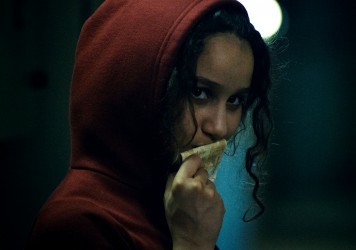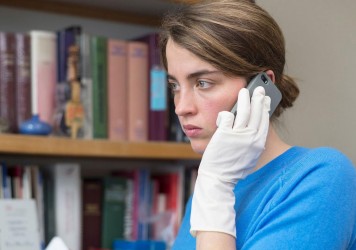This quietly radical and poetic teen drama depicts the black experience in the suburbs of Paris.
In a hired hotel room and a stolen dress, 16-year-old Marieme (first-timer Karidja Touré) proudly bears her new street name, ‘Vic’, dancing with borrowed moves and lip-syncing to someone else’s song in a language not her own. All this appropriation marks the aspirations and ambitions of young black French women unable to find what they crave from within their own immediate environment. Marieme’s need to look outwards for forms of self-expression is reflected in the fact than no other French film before Girlhood has ever focused on the experience of black girls.
Even as Marieme enjoys this snatched moment with the three other members of her bande de filles (‘girl gang’, the film’s original title), she knows that her bubble of happiness will soon burst, and that the injunction of gang leader Lady (Asa Sylla) to “do what you want” is near impossible to realise. Excluded from high school, and kept from openly seeing her boyfriend by her older brother’s violent disapproval, her future in the banlieue seems restricted to the long hours and low pay of her mother, or to prostitution.
The latest exploration of female adolescence from Céline Sciamma (Water Lilies, Tomboy), Girlhood is a fly-on-the-wall, over-the-shoulder exposé of a young woman’s life in a very specific ethnic and cultural milieu, and yet its realism is offset by the stylised recurrence of the number four: four girls in the gang; several key scenes taking place under the sign of Les Quatre Temps in the La Défense district; and a quadripartite structure for the film itself. These are four steps to freedom, as Marieme, at each stage on her journey towards independence, cuts another tie to her past, with defiance and determination her only bulwarks against highly circumscribed Parisian prospects.
Published 7 May 2015
We adored Céline Sciamma’s Tomboy.
The distaff side to Linklater’s (unrelated) Boyhood.
This gendered rites of passage is a bittersweet triumph.

By Ed Frankl
There’s shades of Céline Sciamma’s Girlhood in Houda Benyamina’s stirring debut.

Read part one of our countdown celebrating the greatest female artists in the film industry.

Adèle Haenel turns amateur sleuth as the Dardenne brothers try their hand at the murder-mystery genre.